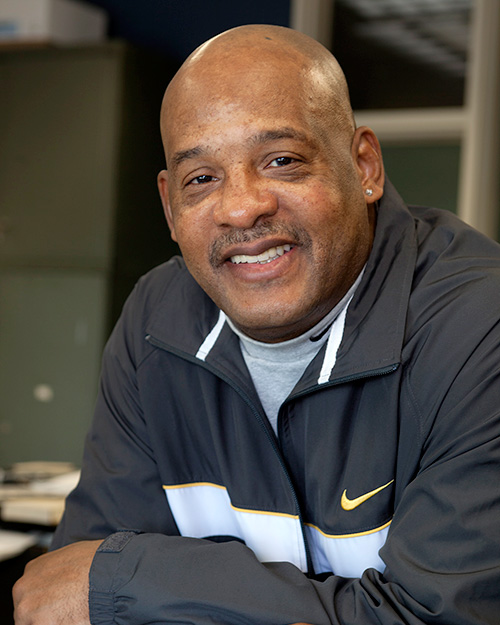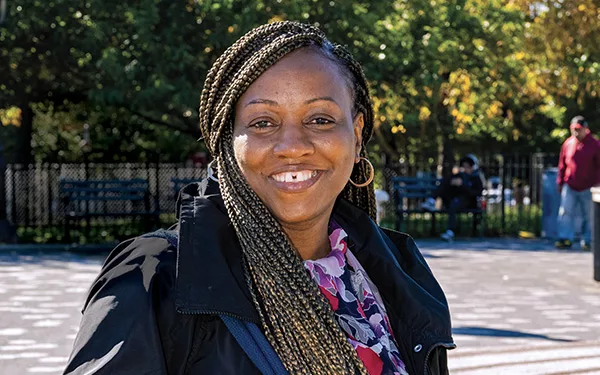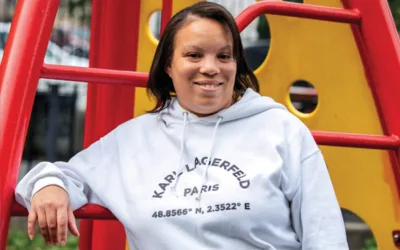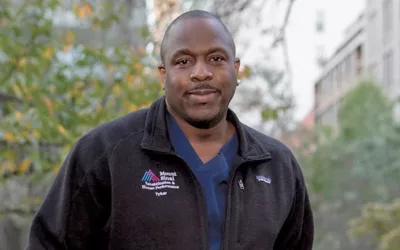Jeffrey Lee of Mount Sinai Beth Israel Hospital
After a serious health scare, Jeffrey Lee put down cigarettes for good, and today he’s breathing easy.
For four long days in June 2012, Jeffrey Lee lay in a hospital bed in Brooklyn and thought about how much was at stake if he kept smoking. Just 55 years old at the time, happily married to his wife, Janine, who is an Outreach Coordinator at the Benefit Funds, and proud father to their 16-year-old daughter, Janay, he was terrified at the thought of not being in their lives. Yet there he was, recovering from a heart attack in the cardiac unit of Long Island College Hospital after being rushed to the emergency room. “It was a traumatic experience that put a lot of fear in me,” he said. “And there wasn’t a bit of doubt about why I had a heart attack: it was from smoking cigarettes.”
Jeffrey, a Personal Care Assistant at Mount Sinai Beth Israel Hospital, had been smoking close to a pack of cigarettes a day for nearly 30 years, but he was now determined to stop. The two months of his strictly monitored recovery after his heart attack helped him avoid most of the triggers that might have led to smoking, he said, since he spent nearly all his time either at home or at a healthcare facility seeing a doctor. But in addition to his heart healing and his health stabilizing enough for him to return to work, two things happened. “I finally realized that every puff had been putting my health in jeopardy, even though I felt fine before my heart attack,” Jeffrey said. “But more important, I realized I could quit – I was living without cigarettes – and it felt good.”
Working in a detoxification and chemical dependency unit at the hospital, Jeffrey saw how hard it was for patients struggling with addiction and said he’s humbled to think his experience might serve as a powerful example. “I tell people that in my mind, I felt like I was health-conscious even though I was smoking – I played basketball every week, I felt like I ate pretty well and had even lost a little weight,” he said. “I blocked out the fact that smoking put me at much higher risk for a heart attack or stroke.”
The experience was a turning point in Jeffrey’s life, and in the last two-and-a-half years he has not only remained smoke-free, he’s become more health-conscious overall. He walks about three times a week, he said, and uses an elliptical machine at home. A nagging hip injury has limited his time on the basketball court, but he isn’t complaining. “Let’s face it, it’s a young man’s game,” he said with a laugh. “I’m 58 years old and other than wanting to drop a few pounds, I feel great.”

He stressed that it’s been tough to stay away from smoking – or to avoid substituting snacks for cigarettes – but that it has become easier over time. He didn’t use smoking cessation products or medications, but said he thinks anyone trying to quit should use whatever they need to quit, such as nicotine patches, gum or medication.
Jeffrey’s cardiologist told him that in addition to giving up smoking, he had to change his diet in order for his heart to heal and regain strength. So he began grilling and baking his chicken, fish and shrimp dinners rather than frying them; eating fresh fruit and vegetables instead of chips, pretzels or other unhealthy snack foods; and drinking water instead of soda. Surprisingly, he found that healthy eating reduced his cigarette cravings, boosting his confidence and helping him stay on track to quitting.
Of course, now that his taste buds are back in action, Jeffrey said he needs to watch his portions and avoid impulsive snacking, especially when working his usual 11:00 pm to 7:00 am shift. But it’s a small sacrifice, he said, especially when he thinks about where he was less than three years ago. “I’m fortunate to have health benefits that allow me to stay on top of my condition, and I’ve taken steps to change and to do the right thing,” he said. “There’s no lasting damage to my heart. Now the rest is up to me.”
What Do Your Benefits Mean to You?
You count on your health benefits to support you in your efforts to stay healthy, whether it’s by getting regular checkups, keeping a chronic condition under control or just improving your lifestyle in general. But has there ever been a time when your health coverage literally saved your life or the life of a loved one? If so, we’d like to hear from you. To share your story with your fellow members in an upcoming issue of For Your Benefit, please contact the Funds at [email protected].
Alice Barnett
Alice Barnett WHY is being healthy so important to Alice? Having her mind at ease about her health allows her to have fun with her daughter.“I enjoy spending time with my daughter—that’s what makes it all worthwhile.”Alice Barnett is a home health aide with Alliance...
Tykar Williams: Member Profile
Tykar Williams Why did Tykar Williams begin his health journey and join WeightWatchers®? Weight loss and pain-free knees have allowed Tykar to fully engage in life.“I feel more energetic now, so I can spend more time with my kids,” he says. “I can even go to hip-hop...
Malikah Weston: Member Profile
Malikah Weston Malikah Weston counted on her health benefits to help her deal with anxiety during the pandemic—and survive a brain tumor.As a Direct Care Counselor at the Cerebral Palsy Associations of New York State, Malikah Weston has cared for people with...




